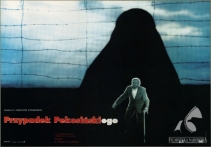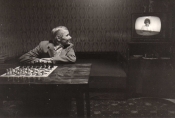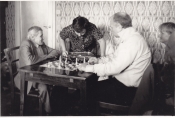PEKOSIŃSKI’S CASE [1993]

year:
- 1993
release date:
- 19 XI 1993
runtime:
- 85 min
directed by:
- Grzegorz Królikiewicz
written by:
- Grzegorz Królikiewicz
director of photography:
- Ryszard Lenczewski
cast:
- Bronisław Pekosiński [as himself], Maria Klejdysz [Danusia, a friend], Anna Seniuk [koleżanka Danusia], Franciszek Trzeciak [secretary Jan Kos], Bronisław Pawlik [the judge], Franciszek Pieczka [Father Michalski], Krzysztof Chamiec [generał Bagno], Aleksander Fogiel [the professor], Witold Pyrkosz [the secretary]
edited by:
- Halina Nawrocka, Teresa Miziołek
music by:
- Antonio Vivaldi
production design:
- Bogdan Sölle
produced by:
- Studio Filmowe „N”
executive producer:
- Waldemar Król
awards:
-
• Polish Feature Film Festival Gdynia 1993: Grand Prix Golden Lions (ex aequo with "The Sequence of Feelings" by Radosław Piwowarski)
• Lubusz Film Summer Łagów 1994: Silver Grape
• IFF Karlovy Vary (Czech Republic) 1994: Special Award for Grzegorz Kólikiewicz
• Cinema Enthusiasts Award Samovar 1994 for Grzegorz Królikiewicz
About the film
The protagonist is a real person, Bronisław Pekosiński, from Zamość; a man who does not know who he is, what his real name is, where and when he was born. Thrown by an unknown mother over the barbed wire of the Nazi camp in Zwierzyniec, he suffered serious injury. The foundling received the surname of the organisation that took him in: the Polish Committee for Social Welfare (Pekos). He went to an orphanage, then graduated from school, worked, and became a county chess champion.
Over time, he started drinking, his health deteriorated and he went off the rails. After a brain haemorrhage, he became a failure of a man. The director decided to make a film which would not only be a story about tragic and undeserved fate, but also a kind of psychodrama, or an attempt to help and rehabilitate.
The story of Pekosiński’s life became a symbol of humanity, it attests to the fragility of human existence and the cruelty and ruthlessness of life; it provokes reflection on the futility of human efforts in shaping one’s destiny.
Donata Zielińska, Leksykon polskich filmów fabularnych, Warszawa 1996










